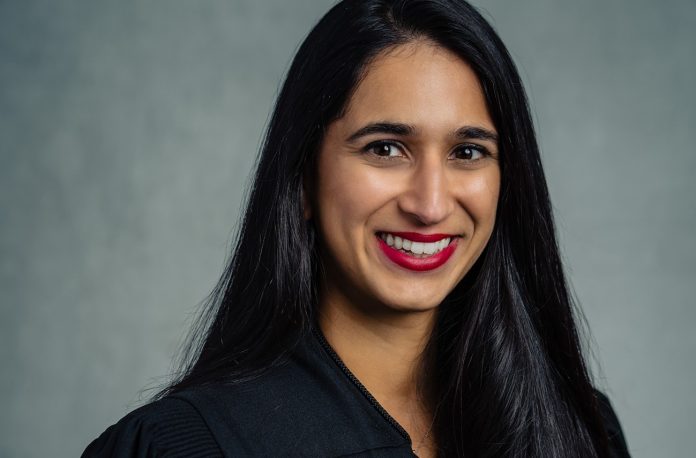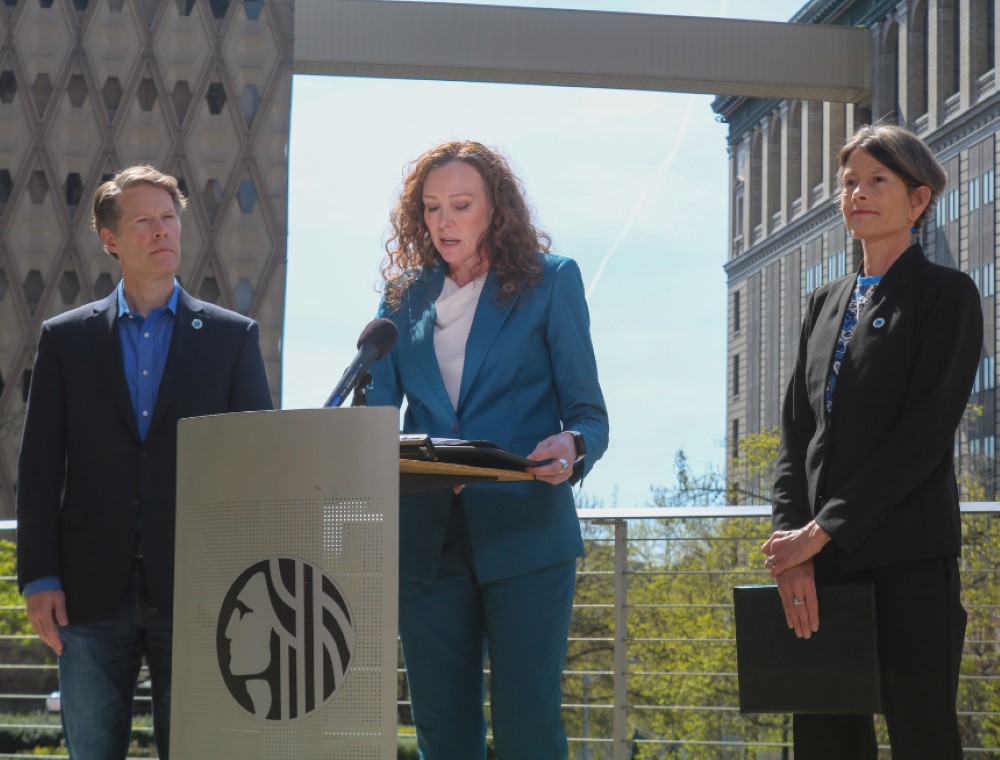
City Attorney Ann Davison, a Republican, seems intent on punishing progressive judges.
Last Friday after business hours, the office of Seattle City Attorney Ann Davison sent two press releases in a classic Friday news dump. One announced a traffic ticket for the Seattle Police Department (SPD) officer that killed Jaahnavi Kandula while driving 74 mph on Dexter Avenue. That may not have been the more concerning news, however, as Davison revealed she was disqualifying a Seattle Municipal Court judge with whom she disagreed in a deeply undemocratic move, given that judges are elected and the judiciary is supposed to be independent from other branches of government.
What doesn’t the City Attorney want us paying attention to?
One of Davison’s press releases announced that her office had filed a traffic infraction against SPD Officer Kevin Dave, who was driving his squad car 74 mph in a 25 mph zone when he ran over Kandula more than a year ago. He is being charged with a “Negligent Driving in the Second Degree with a Vulnerable User Victim” infraction, which is a civil charge punishable by a fine of up to $5,000.
This charge comes after King County Prosecutor Leesa Manion declined to charge Dave with a felony last month. Davison has chosen not to file criminal misdemeanor charges against Dave, instead filing what amounts to a traffic ticket. Only the County Prosecutor can file felony charges.
Kneecapping a political enemy
On the heels of that news, Davison announced she will file an affidavit of prejudice on Seattle Municipal Court (SMC) Judge Pooja Vaddadi in all criminal cases going forward, which in practice means Vaddadi will no longer be able to handle criminal trials.
Along with Judge Damon Shadid, Judge Vaddadi, who began her term at the beginning of 2023, is widely considered to be a progressive judge sitting on a court otherwise known overall for its friendliness to the prosecution. After Vaddadi was elected, she was shut out from the election of the SMC’s new presiding judge, the vote of which was timed so that Judge Adam Eisenberg, who she defeated at the polls, was allowed to vote in her stead. PubliCola reported that in response to this move, Vaddadi said, “I believe this action speaks to the culture of this bench.”
During her run for office in 2022, Vaddadi gave the following answer to People Power Washington’s candidate questionnaire, showcasing a clear commitment to impartiality and proper conduct and perhaps explaining why she is the target of this action:
“I had no plans to run for a judicial position at this point in my career, but after just ten months in the Seattle Municipal Court, it was painfully clear to me that many of our current judges are not acting with the dignity the office requires, fall far short of the standards of professionalism of the other courts in which I’ve practiced, and that their decisions are systematically harming our most vulnerable defendants. As a judge, my mission will be to administer justice impartially, to treat everyone who enters my courtroom with compassion and respect, and to make use of the proven tools of restorative justice that are too often left idle.”
She went on to say:
“One reason that I’m running for Judge is that, all too often, I have seen the judges at Seattle Municipal Court flagrantly going against precedent, and violating their obligations to the law, to the court, and to Seattle. This occurs most often, though not always, at the expense of the defendant….What I’ve seen in Seattle Municipal Court defies what I was taught about due process in law school and what I experienced in other courts in Snohomish, Pierce and King Counties.”
Filing an affidavit of prejudice means the named judge cannot hear the case; Washington court rules allow for both the prosecutor and the defense attorney to disqualify one judge per case should they so choose. But filing a blanket affidavit of prejudice over all future criminal cases for one judge instead of on a case-by-case basis is a remarkable step for the City Attorney’s Office (CAO) to make, acting as a chilling precedent for interfering with the independence of the courts and potentially throwing the SMC into scheduling mayhem.

The recommendation was made by departing Criminal Division Chief Natalie Walton-Anderson, whose last day in her position was March 1. In a memo to all criminal division staff dated February 27, Walton-Anderson wrote, “It has come to a point where Judge Vaddadi’s continued rulings prevent the city from receiving fair hearings and trials, and this action is therefore necessary to protect those rights and the rights of those affected by our inability to ensure fair and equitable hearings.”
The memo continues by listing the reasons for what Walton-Anderson characterizes as an “unusual” decision, most of which are vague and cite examples without case numbers, defendant names, or dates to enable independent research to determine the facts. Given that the CAO surely knew this decision would undergo scrutiny, the choice not to provide specifics is a telling one.
There are less performative avenues that don’t involve such massive escalation for the CAO to raise any criticisms they might have of Vaddadi. As The Stranger reported, the SMC has no record of “King County Superior Court reversing any of Vaddadi’s decisions or rulings based on an appeal from the prosecutor’s office.” Filing a motion for reconsideration or appealing a decision at the King County Superior Court would both be standard and relatively quick actions to take if there were issues with a judge’s conduct or decisions. Issues could also be raised more informally at bench bar meetings and discussing problems directly with Vaddadi, Presiding Judge Chess, or the SMC court administrator.
One example given of Vaddadi’s problematic rulings is her refusal to “issue written No Contact Orders, even in situations with a demonstrated history of domestic violence.” This ignores the fact that in many cases at arraignment the judge doesn’t have enough information to issue a No Contact Order or might choose to issue a verbal one, which allows them to be more focused. No Contact Orders can also be difficult for a victim to remove should they so desire.
Sometimes there are cases when several No Contact Orders are already stacked or where there are child custody issues with specific exceptions already spelled out on the county level that are difficult to replicate at SMC. Sometimes a case is filed right before the statute of expiration two years later, and circumstances have changed such that a No Contact order might even be harmful to the victim.
Furthermore, if someone wishes to have a No Contact Order, they can fill out a form at a county court and still obtain one, which will potentially last longer and offer a renewal option. Knowing of all these possibilities illustrates how vague Walton-Anderson’s memo really is and how important it is to know the specific details of each case before rendering judgment.
Another example of problematic behavior given by Walton-Anderson is that Vaddadi “frequently makes erroneous evidentiary rulings for unjustified reasons, rather than articulating any legal analysis” and “routinely raises arguments on behalf of defendants without prompting or argument from their own attorneys.”
But in her answer to a theoretical question from the People Power Washington voter guide about a party in her courtroom being poorly represented, Vaddadi said, “The legal and ethical constraints on the bench do not permit a judge to interfere when someone is poorly represented. Much as I might like to impose standards of competence on an attorney from the bench, my responsibility will be to the court and to upholding the highest standard of impartiality and decorum.”
It is, however, common for a judge to step in when the law is being misstated or not properly followed or when constitutional rights are being violated, as this is part of the job.
Not Davison’s first unilateral decision as City Attorney
This move by the CAO, described by a former Seattle Municipal Judge and PubliCola as the “nuclear option” and by the Stranger as “usurping the will of the voters,” does not seem out of character for the office under City Attorney Ann Davison.
Last spring she unilaterally ended SMC’s community court program, a move then-Councilmember Lewis cited as a key factor for his vote against criminalizing simple drug possession and public drug use in June. In both cases, the CAO opted for a shocking announcement as opposed to discussing the issues with SMC’s presiding judge or court administrator and possibly finding a less destabilizing compromise.
In another “unusual” move that could be seen as Davison going after her political opponents, the CAO brought a small case against a Stop the Sweeps protester to trial in January, resulting in a hung jury, with four out of six members finding the defendant not guilty. The office considered retrying the case before ultimately dismissing it due to the need to save city resources.
After the election last November, in which several of Mayor Harrell’s favored candidates won their City Council races and another was appointed shortly thereafter, some observers have mentioned City Hall seems to be acting with a new sense of impunity. This latest move by Davison to bar Vaddadi from ruling on criminal cases is on trend with this attitude, timed to coincide with the tenure of a more conservative and inexperienced City Council who is less likely to raise serious complaints. Davison ran for Lieutenant Governor as a Republican in 2020, espousing fringe views before distancing herself from the far right ahead of her 2021 campaign for City Attorney.
Shasti Conrad, the Chair of the Washington State Democratic Party, had this to say about this decision on X: “This is an insane overreach. The conservative bent that Seattle has turned towards is leading to absolute chaos from conservative officials.”
Problems for the Seattle Municipal Court
This decision by Davison will have several consequences. Foremost amongst them is the negative impact on the efficiency of the SMC, which will face administrative turmoil having to juggle its caseload with the sudden inability to schedule any criminal cases with Vaddadi. The Stranger reported that on Thursday SMC Magistrate Seth Niesen “told the courtroom that the City’s strategy stretched the court’s already limited resources.” The remaining judges will all see increased caseloads, meaning they might not be able to move as many cases to trial or be able to hear cases before speedy trial expiration dates.
Resources will also be wasted at a time when the city is bracing to face a $229 million budget deficit next year. Vaddadi will receive her salary whether she is hearing cases or not, but in order to handle the caseload without her, the SMC will have to try to hire pro tem judges to help carry the load. This could easily cost the city thousands of dollars per month.
And prosecutors only get one affidavit of prejudice per case, so burning them all uniformly against one judge to make a political point without allowing individual discretion will not always enable responsible prosecution or the most strategic decision-making.
But perhaps most alarming is the way this decision interferes with the independence of the judiciary. Courts are supposed to be independent from other branches of government, and judges are supposed to be gatekeepers, not adversaries. With this move, however, the CAO has made the court into an adversary in the system by circumventing the checks and balances of the judiciary — which would have included getting Vaddadi’s decisions reversed or filing an ethics complaint against her — and instead making their own judgment against her. Practically speaking, the CAO is removing Vaddadi from being able to function as a judge because they don’t like her decisions. This could directly influence the behavior of other judges and the kinds of decisions coming down from the bench.
Much has been made of Mayor Harrell’s “One Seattle” branding catchphrase, and the new City Council has spoken at length about unity and collaboration, deploring the division of the past Council. But perhaps it’s time to ask the question: what does One Seattle really mean?
In the midst of all this collegiality, who is being excluded? How are accountability and transparency being served? And what basic principles — like the independence of the courts — are being ignored or even actively undermined?
Amy Sundberg is the publisher of Notes from the Emerald City, a weekly newsletter on Seattle politics and policy with a particular focus on public safety, police accountability, and the criminal legal system. She also writes science fiction, fantasy, and horror novels. She is particularly fond of Seattle’s parks, where she can often be found walking her little dog.

